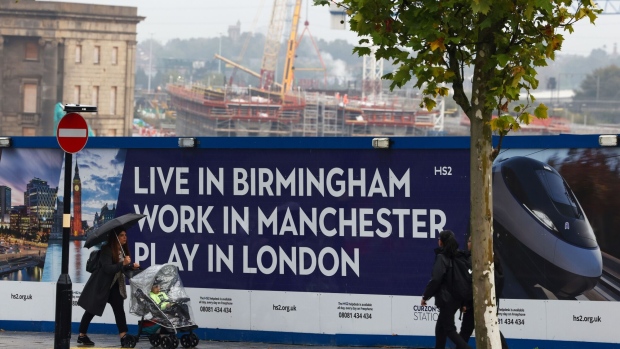Mar 30, 2024
Britain Looks to Peaky Blinders to Revive Industrial Wasteland
, Bloomberg News

(Bloomberg) -- Tommy Shelby, the protagonist of British TV series Peaky Blinders, is known for running lawless slum neighborhoods in 1920s Birmingham.
Yet while he and his family of outlaws are shown terrorizing the streets around the city’s Garrison pub, most of the scenes were filmed elsewhere – in Liverpool, Leeds and Manchester.
Now that’s due to change. When filming for the Peaky Blinders movie begins in the autumn, much of it will be take place in a new studio in Birmingham. “It is our wish and dream after six seasons of Peaky Blinders to bring it home, because virtually all the other series have been shot everywhere but Birmingham,” said Piers Read, head of Time + Space, the company operating the new site.
The Digbeth Loc studios, in the heart of Birmingham’s cultural quarter, are one of several fresh investments coming to the area. Earlier this year, BBC director general Tim Davie announced the broadcaster would bring its drama hub to Birmingham, the second biggest city in the UK. At the same time, High Speed 2 — the £100 billion ($126 billion) rail project connecting London to Birmingham — is expected to bring thousands of jobs to the region, even after it was cut short by the Conservative government last year.
Bringing Peaky Blinders home is personal for Liam Byrne, Member of Parliament for Birmingham Hodge Hill to the east of the city. Byrne, whose family have been in Birmingham for five generations and were gun-makers, is related to the Sheldon family, the real-life Peaky Blinders.
However, Byrne is worried that these investments in Birmingham will fail to benefit deprived areas of the city, which has some of the highest rates of childhood poverty in the UK.
“Tens of billions of pounds are being spent changing the very economic geography of our country,” he said. “And if we can’t ensure that this sorts out the worst unemployment black spot in the country, then frankly that is a failure of politics.”
Banks and trams
Birmingham is not alone. The UK’s plan to “level up” poorer regions has been hampered by a failure to invest in crucial infrastructure. The National Infrastructure Commission, an independent body that advises the UK government, said in a report that the UK’s investment in roads and railways has been the lowest in the Group of Seven nations.
Residents in cities such as Birmingham, Manchester and Leeds suffer longer commute times and fewer affordable homes than their European counterparts — meaning they are less productive, according to the NIC.
Birmingham, which was once the center of the UK’s metal-working industries, saw the collapse of its industrial economy in the early 1980s recession. Brownfield sites across the city — reminders of its industrial past — are now being re-purposed to build homes and offices.
Read More: Follow Goldman Sachs Beyond London, Tory Mayor Tells City Giants
High-skilled jobs in film, finance and other areas of the service economy are flooding in, partly thanks to HSBC, Goldman Sachs and PwC. However, Birmingham’s transport system compares poorly with rival business districts, according to the Centre for Cities, a think tank. The number of people who can get into the center of Birmingham in 30 minutes by public transport is smaller than in comparably-sized European cities.
“Policy conversations over the last decade have put too much emphasis on connections between cities rather than understanding how to improve connections within cities,” said Paul Swinney, director of policy and research at the Centre for Cities.
Byrne has been campaigning for the area’s tram line to be extended from the city center, through East Birmingham and to North Solihull, but funding has yet to be agreed.
“A lot of new jobs will be created around the city center and we’ve got to transport people to those jobs,” said Byrne. “At the moment we’ve got one of the lowest rates of car ownership in the country, and high levels on congestion.”
The problem was summed up by Birmingham Airport Chief Executive Officer Nick Barton, who said there were limited options for workers such as baggage handlers to commute to the hub in the early hours other than by car. “If they don’t drive, they probably don’t work here.”
HS2
The project to build the rail line, known as HS2, has brought new opportunities and is expected to create almost 31,000 jobs in the West Midlands over the next decade. Prime Minister Rishi Sunak controversially scrapped the northern legs of HS2 last autumn, following years of steep increases to the overall budget. The move triggered anger from politicians in the north of England, but the Midlands is still set to benefit from the truncated line. Once operational, the depot in East Birmingham will employ 550 people.
“Local communities are contributing and building toward it, and then longer term, once it is operational, we’re making sure that we provide longer-term jobs for people as well,” said Luke Nipen, head of community and stakeholder engagement at HS2.
Back at Digbeth Loc, Read hopes that a lot of the talent required for his new studio already exists in Birmingham. Film industry professionals living in the Midlands often travel to the north west of England or London for work, he said. Digbeth Loc is also partnering with the London Film Academy to create a similar venture in Birmingham to churn out the next wave of producers and directors.
The West Midlands contains “a huge vast area” of untapped potential, Read said. “It’s like a playground for producers to go into all these new locations and discover places that have never been filmed before.”
--With assistance from Kate Duffy.
©2024 Bloomberg L.P.


